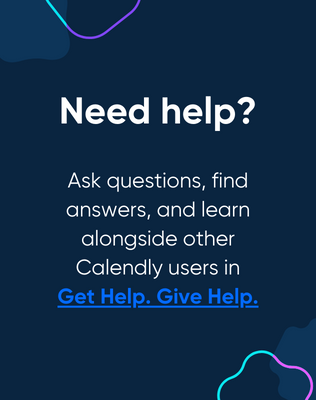I’ve had someone schedule time with me a number of times and never shows up. Is it possible to block someone from scheduling time on my calendar?
Block a person from scheduling
Best answer by Kelsi
Hey
At this time, there is no way to directly block a specific person from booking with you via your public booking page. I really am sorry to say that (I haaate telling our users “no” in any case).
That said, we do have some workarounds I can outline for you, and hopefully they will be helpful!
Depending on how you've shared your link, you may want to consider exploring the following options:
- Changing the event URL, and sharing a new event link.
- Alternatively, if you have shared your personal scheduling page- and not the event-specific link- you could make the event secret which would ensure it did not appear on your main scheduling page. Any invitees would need to use the event-specific link to access your booking page, which would only be provided by you.
- In the future, I would also suggest sharing single-use links for specific event types. With single-use links, meeting links will expire once used and invitees will not be able to book another. Your event-type URL will never be exposed, preventing any unwanted repeat bookings on your calendar.
We’ve taken serious measures on the back end to mitigate spam events and abusive tactics and are always looking into more ways to prevent unwanted meetings. These measures include:
- Improvements to reduce spam, including suspension of fraudulent accounts, preventing automated account creation, bot detection on our bookings
- Hiring an entire team dedicated to Abuse, Trust & Safety, which is constantly working on evolving our abuse detection and response tools -
- Maintaining an internal monitoring tool that detects and blocks spam messages generated from Calendly before they get sent. It does not catch everything, but it lowers how much spam gets out -
- On-call teams that respond to Terms of Use violations and suspend bad accounts as soon as they are detected
If any event winds up on your Calendly that shouldn’t have, you can click the Report this event link either on the email notification you receive for the event or in the Scheduled Events tab in Calendly, as shown in the screenshot below. This cancels the meeting and reports the data to us, so we can continue to improve our abuse prevention measures:
Please note: Reporting an event does not block that invitee from booking with you in the future. However, it does add the invitee's email address to our logs which are being closely monitored by our Product team for future improvements around the issue of undesirable bookings.
I know this isn't exactly what you wanted to hear but do hope the information helps, at least somewhat!
Sign up
Already have an account? Login
Not a Calendly user yet? Head on over to Calendly.com to get started before logging into the community.
Employee Login Customer LoginLogin to the community
Not a Calendly user yet? Head on over to Calendly.com to get started before logging into the community.
Employee Login Customer LoginEnter your E-mail address. We'll send you an e-mail with instructions to reset your password.



